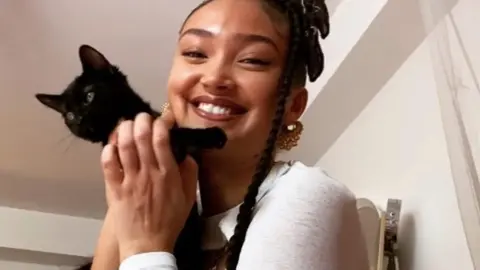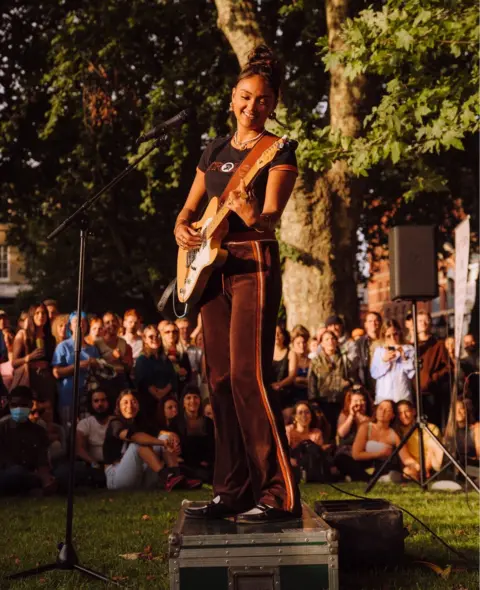Joy Crookes, her cats, and an album of soulful wisdom
 Insanity Records
Insanity Records"Nishu, get down from there!"
Joy Crookes is having cat trouble. The Brit Award-nominated singer is currently looking after a friend's pet Burmese, and it's encouraging some high jinx from her own little furball.
"If they're not eating my birthday cake from the weekend, then they're coming up with all sorts of naughtiness," laughs the singer, who has just turned 23.
For the next 40 minutes, our attempts to discuss her beautiful, vibrant debut album, Skin, are constantly interrupted by Nishu and Diego, who are convinced an empty can of tuna in the recycling bin is a gourmet feast of indescribable scrumptiousness.
"Argh, they're driving me crazy!" laughs Crookes, turning her camera around to record the carnage.
Messy imperfection is sort of Crookes' thing. Her music dwells in life's grey areas - love affairs that don't quite click; inter-generational trauma; the contradictions of online activism; the messy business of family relationships.
Allow Google YouTube content?
Her songs have been likened to Amy Winehouse and, for once, neither artist suffers from the comparison. These are deep, soulful songs shot through with hard-earned wisdom, and curiosity about her surroundings.
The sweeping jazz of 19th Floor reflects on her Bangladeshi-Irish heritage, while casting a mournful eye over the gentrification of her native Elephant and Castle - an inner-London neighbourhood.
"Skylines that I don't recognise/ Strip the life out of these streets/ It's a daylight robbery".
The city's characters - taxi drivers, Tory neighbours, young people discovering their sexuality, immigrants and anti-immigration protestors - are sprinkled throughout the record, informing Joy's own thoughts and experiences.
"I think I'm just interested in people," says the 23-year-old. "I'm interested in how we work. And because of that, I talk to a lot of people.
"I don't necessarily agree with all of them; but I grew up in such a multifaceted city - and a community within this city - that it feeds into my music. It's just how I've always been."
And so, against a backdrop of feline frolics, she let us into the album's deepest secrets.
 Joy Crookes / Twitter
Joy Crookes / TwitterBefore we discuss anything else, can I congratulate you on getting the word malarkey into a song?
Yeah! I want to get palaver into a song, too. And banjaxed.
Your first album is a big deal. How did you prepare for the shift from singles and EPs to making a complete record?
It starts subconsciously. You always know that EPs are almost like warm-ups to actually releasing an album. And I knew that I wanted more - better songs, better production value. I wanted it to be stronger and bigger, and that meant if I had to rewrite lyrics, I would rewrite lyrics. Instead of just recording a string section in the living room, I did it in Abbey Road.
What was that like?
We weren't there for very long - about three hours - but it was a big deal. We had a whole string section playing music that I wrote when I was drunk and eating a bucket of chicken. It was nuts. I was in absolute tears.
You should have bought a bucket of chicken for the orchestra…
Yeah, so they could get into the zone. We'd have had to get them boozed up as well.
 Joy Crookes
Joy CrookesI love all the little voice notes from your family that you've included. Are they chuffed to be on the record?
I don't think they're even fully aware of what's going on. My dad was like, 'Who the heck's that talking at the end of the song?' And I was like, 'That's you, dad!'.
There's a clip of your mum coaching you through a heartbreak, too…
That was in a nail shop in Brixton, two days after my ex moved out. I was physically and mentally broken and I thought getting my nails done would make me feel better! Mum was just speaking to me about heartbreak and I pressed record on my voice memos.
She's speaking in Bangla at one point and she's just like, you know, শান্ত থাক. That means relax, calm down. She was like, "This is one bad thing that's happened out of many good things. Focus on the good things." It's really simple advice but hearing it from a parent is kind of wild.
And just for the record, did getting your nails done help?
No! I don't even remember what I did to them!
 Insanity Records
Insanity RecordsThe album opens with I Don't Mind - which I thought was going to be a love song, but it ends with you telling the guy, "If you're getting serious, then this is over". And it struck me that men often write about casual relationships, but it's much less common for women.
Okay, I'll be really honest, I actually wrote it to play it to him - so that he'd understand the relationship was not going to go anywhere. And we ended because I didn't want it to go anywhere.
I've spoken to a lot of brown women who've said it was empowering to hear someone talk about their body and sex like that. And I was like, "Well, I mean, it's important, but also it's just like an everyday thing, isn't it?"
Yeah, love songs can feel formulaic - but casual relationships are really common.
As is being alright with not having a serious relationship; and being alright with my body. In order to write and release a song like that, there does have to be an element of not caring what you think. Some people will think I'm a hoe or this, that and the other. But it's my body. I'm going to do whatever I want with it.
When You Were Mine is about being on the other side of that equation, I guess?
When You Were Mine is about my first love, who got in a gay relationship with another man after we broke up.
It's like, "I'm shook but you look good together and I'm proud of you." It's a little bit of jealousy and it's a celebration of their love.
Allow Google YouTube content?
19th Floor fits into your canon of London songs. What's the story behind that one?
It's a song about belonging - but it touches on so many subjects. It's a comment on immigrants, it's a comment on gentrification, and it's a metaphor for all the things my grandma and my mum had to go through to give me the life that I have Getting this opportunity to be a musician. And I think that that's a universal story for a lot of immigrants in this country.
On Kingdom, you write about the wave of anti-immigration sentiment.
Yeah, I wrote that the day after the Tories were re-elected in December 2019. There was just a feeling on the streets. That's something that I talk about throughout the album, generational trauma. Stuff being passed down. The decisions that an older majority make in this country will inevitably affect the younger generations.
You go to some really vulnerable places on the record. The title track is about trying to help someone who's given up on life.
That's not an easy song to sing.
I felt like the only way I could make them realise that they were worth more was by writing them the song. That song was never meant to be released, it was meant to be for someone. And even having to tap into that place, I was in the studio crying my eyes out.
You can hear the emotion in the recording.
There's so many cracks in my voice and in that vocal take. There are a lot of times where I'm actually singing flat. And intentionally, we didn't get rid of any of that.
Allow Google YouTube content?
Unlearn You is another tough song… I understand if you don't want to talk about it, but it's about the effects of sexual violence.
I don't know how I managed to get that one out. I had the lyric, "unlearn you from my body", and I was interested in how, when you break up with someone, you still have phrases that you share and so you have to unlearn them.
Then when I started to write the melody, I realised what I'm really trying to talk about is unlearning something that happened to me that was completely out of my control.
It's something that happens to so many men and women. You're in a situation where someone else takes control of your body, your mind, your everything and how do you survive? How do you, more importantly, find a way to unlearn that from your body and not blame your body and not blame yourself for something as scary as that.
Why do you think guilt is such a common emotion in that situation?
It's the knee-jerk reaction. "If I'd done this or if I'd done that, maybe it wouldn't have happened." Your feeling of control vanishes and it's so much easier to take that out on yourself.
It's such a layered subject. Anything to do with abuse is so layered. And that's why that song is like, "Can I unlearn you from my body?" It's a question. I'm not even sure of it. It's like, do I unlearn you or do I live with you?
 Getty Images
Getty ImagesLike a lot of your songs, it's so nuanced. There's vulnerability and strength and doubt, and they all intertwine. Are you aware of how unusual that is in pop music?
But that's what real life is like. It's a genuine reflection of being a human being. In order to find strength, in order to feel powerful, you have to address survival, you have to address the stuff that you've gone through in order to be that person.
Life is messy. Just like your pets. Maybe I should let you go and wrangle those cats…
That's exactly what I'm going to do. He's in the bin. He's literally inside of the bin.

Follow us on Facebook, or on Twitter @BBCNewsEnts. If you have a story suggestion email [email protected].
